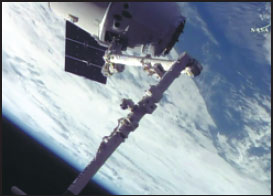SpaceX's first recycled Dragon arrives at space station
MIAMI - SpaceX's first recycled spaceship arrived at the International Space Station on Monday, two days after the unmanned Dragon cargo capsule launched atop a Falcon 9 rocket from Cape Canaveral, Florida.
Live images on NASA television showed the spaceship approaching the orbiting outpost, then being grabbed with the station's robotic arm.
"Capture complete," said NASA astronaut Peggy Whitson, who operated the robotic arm from inside the station.
The spaceship is carrying 2.7 tons of science research, crew supplies and hardware.
It was originally flown on SpaceX's fourth resupply mission in 2014.
Its arrival makes it the first US spaceship to return to the space station since the US space shuttle program ended in 2011.
The latest mission is SpaceX's 11th cargo resupply trip to the ISS under a $1.6 billion contract with NASA.
SpaceX is working on a version of its Dragon capsule that will carry crew to the space station, perhaps as early as next year.
The company also regularly returns the first stage of its Falcon 9 rockets to upright landings on Earth, as part of an effort to increase reusability and lower the cost of spaceflight.
The Dragon capsule also carried devices from China for the country's first scientific research project aboard the station.
The project between the Beijing Institute of Technology and NanoRacks, a US company, aims to investigate how the space environment affects DNA, said Deng Yulin, a life sciences professor with the institute who leads the research project, on Sunday.
The research will study gene mutation, one of the biggest risks to astronauts working on space missions, as they are exposed to 10 times the radiation levels in space than on earth, he said.
Previously, equipment for space experiments was sent via China's 2011 launch of the Shenzhou-8 spacecraft, its 2016 lift by a Long March-7 rocket and via China's cargo spacecraft Tianzhou-1 in 2017.
"The research team caught evidence of the gene mutation after the first experiment via Shenzhou-8, which proves the space environment can cause DNA mutation and biomolecular changes," Deng said.
The research aboard the ISS will continue to study whether gene mutation follows any rules in a space radiation and microgravity environment, he said.
Afp - Xinhua
|
|
(China Daily 06/07/2017 page12)









